Are you looking for the best business bank account that suits your needs, but don’t know where to start? Whether you’re just starting out as an entrepreneur in the UK or are expanding your business, it’s important to find the best bank account that won’t take away from what matters most — running and growing your company.
Let us help guide you through some of the best business bank accounts available in the UK and provide insight into finding one that fits all your requirements.
Top 10 featured business bank accounts
| Bank | Account | Details | View offer |
|---|---|---|---|
 |
Airwallex ✓ Multi-Currency Account With Local Details ✓ International Transfer At Interbank Rates ✓ Borderless Cards & Expense Management Pricing • Trial period • Contact |
View Deal | |
 |
Revolut Business ✓ Business Current Account ✓ Award-Winning Mobile App ✓ Quick & Easy Application Process Pricing • Trial period • Contact |
View Deal | |
 |
Tide Business Bank Account ✓ Free, Plus, or Pro Account ✓ iOS & Android Mobile App ✓ Upload & Auto-Match Receipts Pricing • Trial period • Contact |
View Deal | |
 |
Card One Money ✓ No Credit Checks ✓ Simple Fees ✓ Up to 3.5% Cashback Pricing • Trial period • Contact |
View Deal | |
 |
ANNA Money ✓ Apply in 10 minutes ✓ Bookkeeping & Payroll Tools ✓ User-Friendly Mobile App Pricing • Trial period • Contact |
View Deal | |
 |
Co-Op Business Bank Account ✓ Business Current Account ✓ Online, App & High Street Banking ✓ Quick & Easy Application Process Pricing • Trial period • Contact |
View Deal | |
 |
HSBC Business Bank Account ✓ Business Current Account ✓ In-Branch, Online & App Banking ✓ FSCS Protected Pricing • Trial period • Contact |
View Deal | |
 |
Metro Business Bank Account ✓ Business Current Account ✓ High Street Presence ✓ FSCS Protected Pricing • Trial period • Contact |
View Deal | |
 |
Mettle Business Bank Account ✓ Business Bank Account ✓ Online & App ✓ Quick & Easy Application Process Pricing • Trial period • Contact |
View Deal | |
 |
Monzo Business Bank Account ✓ Business Current Account ✓ Dedicated mobile app experience ✓ FSCS Protected Pricing • Trial period • Contact |
View Deal | |
 |
Virgin Money Business Banking ✓ Business M Account ✓ In-Store, Online & App Banking ✓ Insights & Forecasting Platform Pricing • Trial period • Contact |
View Deal |
Best business bank accounts UK – top 58 providers compared
| Bank | Lowest monthly fee | Offers current account | Offers savings account | Overdraft available |
|---|---|---|---|---|
| 3S Money | $100 | Yes | No | No |
| Acorn Account | £12.50 | Yes | No | No |
| Airwallex | Free | Yes | No | No |
| Aldermore | Free | No | Yes | No |
| Allica Bank | Free | Yes | Yes | No |
| Allied Irish Bank | £2.50 | Yes | Yes | Yes |
| Amaiz | £9.99 | Yes | No | No |
| ANNA Money | £14.90 | Yes | No | No |
| Atom Bank | Free | No | Yes | No |
| Bank of Scotland | Free | Yes | Yes | Yes |
| Barclays | £8.50 | Yes | No | No |
| Bunq | € 4.99 | Yes | No | No |
| Cambridge Building Society | Free | No | Yes | No |
| CardOneMoney | £12.50 | Yes | No | No |
| Cashplus | Free | Yes | No | No |
| Cater Allen Private Bank | Free | Yes | Yes | No |
| Charity Bank | Free | No | Yes | No |
| Clydesdale Bank | £6.50 | Yes | Yes | Yes |
| Co-operative Bank | £7 | Yes | Yes | Yes |
| Countingup | Free | Yes | No | No |
| Cumberland Building Society | Free | Yes | Yes | Yes |
| Cynergy Bank | £5 | Yes | Yes | Yes |
| Danske Bank UK | £9 | Yes | Yes | Yes |
| Fair Everywhere | £12.50 | Yes | No | No |
| GoSolo | Free | Yes | No | No |
| Hampshire Trust Bank | Free | No | Yes | No |
| Holvi | € 9 | Yes | No | No |
| HSBC | £6.50 | Yes | Yes | Yes |
| ICICI Bank UK | Free | Yes | Yes | No |
| Intergiro | € 9 | Yes | No | No |
| Kent Reliance | Free | No | Yes | No |
| Kinetic | £6.50 | Yes | Yes | Yes |
| Lloyds Bank | Free | Yes | Yes | Yes |
| Masthaven | Free | No | Yes | No |
| Metro Bank | £6 | Yes | Yes | Yes |
| Mettle | Free | Yes | No | No |
| Monese | £9.95 | Yes | No | No |
| Monzo | Ask | Yes | Yes | No |
| Nationwide | Free | No | Yes | No |
| NatWest | Free | Yes | Yes | Yes |
| OakNorth | Free | No | Yes | No |
| PayPal | Free | No | No | No |
| Redwood Bank | Free | No | Yes | No |
| Revolut Business | £7 | Yes | No | No |
| Royal Bank of Scotland | Free | Yes | Yes | Yes |
| Santander | £7.50 | Yes | Yes | Yes |
| Shawbrook Bank | Free | No | Yes | No |
| Silverbird | Free | Yes | No | No |
| Starling Bank | Free | Yes | No | No |
| State Bank of India (UK) | £25 | Yes | Yes | Yes |
| Tide | £9.99 | Yes | No | No |
| Triodos Bank | Free | Yes | Yes | Yes |
| TSB | £5 | Yes | Yes | Yes |
| Ulster Bank | £2.67 | Yes | Yes | Yes |
| United Trust Bank | Free | No | Yes | No |
| Virgin Money | £6.50 | No | Yes | No |
| Wise | Free | Yes | No | No |
| Yorkshire Bank | £5 | Yes | Yes | Yes |
1. 3S Money
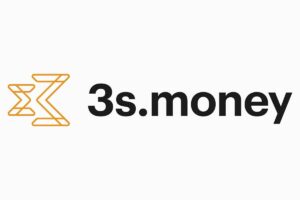
3S Money offers an online business account designed for global market access. It supports operations in over 190 countries and offers transactions in 65+ currencies.
Business account features
Key features include high-value international payments, 5x cheaper foreign exchange fees, and integration with major online marketplaces.
3S Money provides two types of accounts: Standard International, ideal for importers, exporters, and e-commerce businesses, and Bespoke International, suitable for businesses with complex structures.
Fees and charges
The accounts come with a $100 monthly maintenance fee and require a minimum balance of $300.
It’s important to note that 3S Money is not a traditional bank but an Electronic Money Institution regulated by the UK’s Financial Conduct Authority, and it does not loan out client funds, ensuring 100% liquidity.
Read our 3S Money review or visit the website.
2. Acorn Account

Acorn offers a business account for small businesses with an annual turnover of £2 million or less. The account can be opened online in 24 hours without a credit check, subject to identity and business checks.
Business account features
Features include 24/7 online banking, prepaid Mastercard, SMS, telephone banking, and the ability to deposit cheques and cash at Barclays branches.
Fees and charges
It charges a £65 account application fee, a minimum monthly fee of £12.50, and additional fees for various transactions.
Acorn is an Authorised Payment Institution, not a bank, and thus deposits are not covered by the Financial Services Compensation Scheme (FSCS).
Read our Acorn Account review or visit the website.
3. Airwallex

Airwallex provides full-featured business accounts geared towards global operations.
Business account features
It offers multi-currency accounts, high-speed international transfers, borderless cards, expense management, and online payments.
The platform integrates with other popular platforms like Xero, Amazon, and Shopify for streamlined financial operations.
Airwallex’s accounts are designed for ease, eliminating the need for bank queues and paperwork, and they offer automated solutions for bill pay, foreign exchange, and expense management.
Read our Airwallex review or visit the website.
4. Aldermore

Aldermore Bank offers fixed rate and easy access business savings accounts with consistently high interest rates, simple account management, and no fees or charges.
Business account features
Their 1-year fixed rate account offers a 4.50% interest rate (AER) with a minimum opening balance of £1,000, suitable for those who don’t need to withdraw during the term. The 6-month fixed rate account offers a 4.05% interest rate with similar terms.
They also provide an easy access business savings account with a 3.25% interest rate, ideal for those requiring flexible withdrawals.
Funds are protected up to £85,000 by the FSCS.
Eligibility
To be eligible, businesses must be UK-based, and the primary account holders must be over 18 years old and UK residents.
Read our Aldermore review or visit the website.
5. Allica Bank
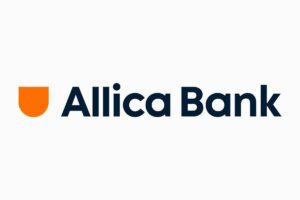
Allica Bank offers a Business Rewards Account for established small and medium-sized enterprises (SMEs) in the UK.
Business account features
The account features no monthly fees, free bank payments, and up to 1.5% cashback on eligible purchases.
The account also offers an instant access savings pot with a 3.5% AER. Eligible deposits are protected up to £85,000 by the FSCS.
However, it does not support international payments or cash and cheque deposits.
Eligibility
Eligibility criteria include having at least seven employees or an annual credit turnover greater than £700,000.
Read our Allica Bank review or visit the website.
6. Allied Irish Bank
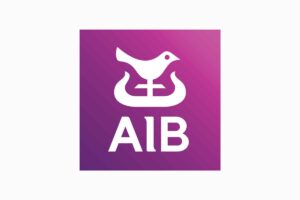
Allied Irish Bank (GB) offers a business current account with a quarterly fee of £10.
Business account features
The account features internet banking, electronic payments, a business debit card, and an overdraft facility. International payments in various currencies are possible, but may incur additional charges.
Fees and charges
Additional fees include 55p for debit card transactions and direct debits, and varying charges for cash and cheque deposits.
Eligibility
To open an account, proof of identity, address, registered business name, and contact details are required.
Read our Allied Irish Bank review or visit the website.
7. Amaiz
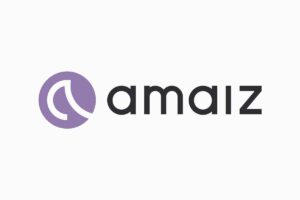
Amaiz provides online and mobile banking for sole traders and small businesses.
Business account features
The accounts come with built-in invoicing, accounting, and banking services.
The account features include automated invoicing, specialist customer support, discounted card payment machines, and instant payment notifications.
Fees and charges
There are two account options for sole traders and small businesses: one with a £4.99 monthly fee plus VAT and another for £9.99 plus VAT. For limited companies, account options include a £24.99 plus VAT option and a £99 plus VAT option.
The accounts have various fees, including for ATM withdrawals and international transfers.
Read our Amaiz review or visit the website.
8. ANNA Money

ANNA Money offers business accounts for sole traders and small businesses, featuring tools for automating admin tasks like tax return reminders and invoice creation.
Business account features
ANNA offers 24/7 customer service and integrates with software like Xero.
However, it does not accept cheques and is not covered by the FSCS.
Fees and charges
Their ‘pay as you go’ account has no monthly fee, with charges for specific services like tax filing.
Eligibility
Eligibility includes being a sole trader, director of a limited company, or partner in an LLP, and being based in the UK.
Read our ANNA Money review or visit the website.
9. Atom Bank

Atom Bank does not offer business current accounts but specialises in savings accounts and secured loans.
Business account features
Their savings accounts include the Instant Saver, with no minimum deposit and an EAR of 2.95%, and Fixed Saver accounts with terms from six months to five years, offering higher interest rates.
For secured loans, interest rates are either fixed or variable, depending on the loan type.
Eligibility
Eligibility for opening a savings account is open to any business or sole trader, but Atom Bank is more stringent with loan applications, especially for businesses with financial difficulties.
Read our Atom Bank review or visit the website.
10. Bank of Scotland
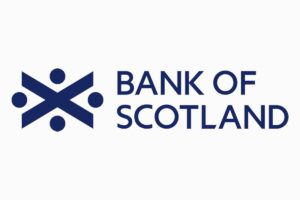
Bank of Scotland offers a variety of current accounts for businesses, including start-ups, larger businesses, and specialist accounts for schools and community groups.
Fees and charges
Their start-up account for businesses with a turnover under £3 million has no monthly fee for the first 12 months, then a £7 monthly fee thereafter.
The larger business account offers two tariffs: Business Extra and Electronic Business, with monthly fees of £15 and £20, respectively.
The community account provides free day-to-day banking with no monthly fee for eligible applicants.
Accounts are eligible for FSCS protection up to £85,000.
Read our Bank of Scotland review or visit the website.
11. Barclays
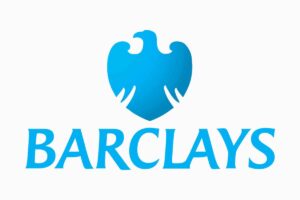
Barclays‘ Startup Business Account offers new businesses free banking for 12 months. This includes no charges for everyday transactions.
Fees and charges
After the free period, charges apply: electronic payments cost 35p, cash payments 1.50% (min £1.50), and cheques £0.65 per cheque.
They also offer a Mixed Payments Plan and an e-Payments Plan, tailored to different transaction types, typically costing around £6 to £6.50 per month.
Interest rates on their business savings accounts vary, with the current rate for their Business Premium Account at 0.01% AER.
Eligibility
Eligibility criteria include being a UK resident and having a business operating in the UK.
Read our Barclays review or visit the website.
12. Bunq

Bunq offers several account tiers for businesses: Easy Bank Business at €2.99 per month, Easy Money Business at €9.99 per month, and Easy Green Business at €19.99 per month.
Business account features
These accounts include features like multiple currencies, real-time notifications, and integrated accounting.
Fees and charges
Transaction fees for international payments are competitive, often based on the mid-market exchange rate plus a small markup.
Bunq’s accounts are particularly suitable for freelancers and SMEs, with minimal eligibility requirements beyond identity verification and business registration.
Read our Bunq review or visit the website.
13. Cambridge Building Society

The Cambridge Building Society‘s business savings accounts include the Business Instant Access account, offering an interest rate of 0.15% AER on balances above £1,000, and the 30-Day Business Notice account with a rate of 0.20% AER for balances over £10,000.
Fees and charges
There are no monthly fees for maintaining these accounts, but transactional fees apply for unusual activities, such as CHAPS payments, typically costing around £25 per transaction.
Eligibility
To open an account, businesses need to be registered in the UK, and additional requirements may apply depending on the account type.
Read our Cambridge Building Society review or visit the website.
14. CardOneMoney
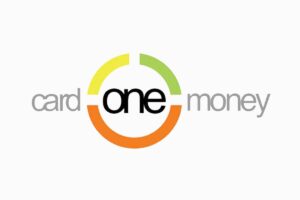
CardOneMoney offers a business current account primarily aimed at small businesses and startups. The account has no credit check requirement for opening.
Business account features
Key features include online banking, a business Mastercard, and the ability to manage multiple users.
However, CardOneMoney does not offer an overdraft or loan facility, and it’s important to note that it is not covered by the Financial Services Compensation Scheme (FSCS).
Fees and charges
They charge a monthly account fee of £12.50, with additional fees for transactions: £0.30 for electronic payments, £0.65 for direct debits, and £0.85 for ATM withdrawals. Cash deposits are charged at 0.5% (min £1.50). There’s also a one-time £55 application fee.
Read our CardOneMoney review or visit the website.
15. Cashplus

Cashplus provides a business current account known for its simplicity and ease of use, catering especially to SMEs, freelancers, and startups.
Business account features
The account features include online banking, a contactless Mastercard, and UK-based customer service.
Fees and charges
Cashplus charges a monthly fee of £9.95 for the account, with electronic payments and direct debits being free of charge. Cash withdrawals are charged at £2 per transaction, and there’s a fee of 0.3% (min £3) for cash deposits. The account also allows for up to £2,000 of overdraft with a representative APR of 24.9%.
Read our Cashplus review or visit the website.
16. Cater Allen Private Bank

Cater Allen, part of the Santander Group, offers a Reserve Business Account with a more traditional banking approach.
Business account features
The account requires a minimum balance of £5,000 to avoid the monthly fee of £25.
Interest is paid on balances over £10,000, with rates varying based on the account balance.
Fees and charges
Transaction fees include 30p per cheque paid in or written, 30p for standing orders and direct debits, and 30p for electronic payments.
The interest rate starts at 0.01% AER for balances over £10,000.
Eligibility
Applicants must be UK residents and provide proof of business activity in the UK.
Read our Cater Allen review or visit the website.
17. Charity Bank

Charity Bank specialises in offering accounts for charities, social enterprises, and community organisations.
Business account features
Their Ethical Business Account is designed for non-profits and socially-focused businesses. The account requires a minimum opening deposit of £1,000, and there’s no monthly account fee.
Fees and charges
Transaction fees include 30p per cheque paid in or issued and 18p for direct debits. Internet banking is available at no extra cost. Interest is paid on balances above £5,000, with rates varying; the rate is approximately 0.05% AER.
Eligibility
Applicants must be UK-based charities or social enterprises.
Read our Charity Bank review or visit the website.
18. Clydesdale Bank
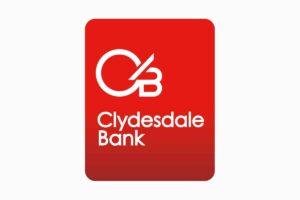
Clydesdale Bank offers a range of business accounts including a Business Current Account and a Business Choice Account. Their accounts cater to businesses of all sizes.
Fees and charges
The Business Current Account has a monthly fee of £6.50, with transaction fees of 30p per cheque or direct debit and 30p for electronic payments.
The Business Choice Account offers tiered interest rates on surplus funds and charges a higher monthly fee depending on the account balance and transaction volume.
Eligibility
Eligibility requirements include proof of business operations in the UK and standard identity verifications.
Read our Clydesdale Bank review or visit the website.
19. Co-operative Bank

The Co-operative Bank provides a Business Current Account known for its ethical banking principles.
Fees and charges
They offer 18 months of free day-to-day banking for new businesses, after which fees apply based on account usage.
Standard charges include 30p per cheque or direct debit and 23p per £100 for cash deposits.
Business account features
The account also features online banking and a contactless Visa debit card. Interest is not typically paid on current account balances.
Eligibility
To open an account, businesses must operate in the UK and meet the Co-operative Bank’s ethical policy criteria.
Read our Co-operative Bank review or visit the website.
20. Countingup

Countingup is a fintech company offering an all-in-one business current account and accounting solution, primarily aimed at small businesses and freelancers.
Business account features
Their account features include automated bookkeeping, invoicing, and tax estimates.
Fees and charges
The pricing structure is tiered based on monthly deposit amounts: the Starter plan is free for deposits under £500 per month, the Standard plan costs £4.95 per month for deposits between £500 and £1,500, and the Premium plan is £9.95 per month for deposits over £1,500.
There are no charges for electronic payments, but ATM withdrawals cost £1, and there’s a 2% charge for cash deposits.
Read our Countingup review or visit the website.
21. Cumberland Building Society

Cumberland Building Society offers a Business Current Account mainly for local businesses and organisations in the UK, especially in the North West of England.
Fees and charges
The account has no monthly fee and offers features like a Visa debit card, online banking, and overdraft facilities.
Transaction fees include 65p for cheques paid in or issued, and cash handling is charged at 0.65% of the value. Interest is not typically paid on current account balances.
Eligibility
Eligibility is focused on businesses operating within their branch network area, with standard identification and business documentation required.
Read our Cumberland Building Society review or visit the website.
22. Cynergy Bank
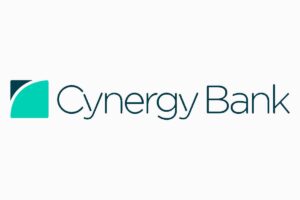
Cynergy Bank, formerly known as Bank of Cyprus UK, provides business banking services with a focus on small to medium-sized enterprises.
Fees and charges
Their Business Current Account requires a minimum deposit of £1,000 to open. The account carries a monthly maintenance fee of £7.50.
Transaction fees include 30p per cheque paid in or issued, 30p for standing orders and direct debits, and 40p for electronic payments.
They also offer deposit accounts with competitive interest rates; for instance, their 95-Day Notice Account offers an interest rate of around 0.60% AER for balances over £10,000.
Eligibility
Eligibility criteria include UK residency and proof of business operations in the UK.
Read our Cynergy Bank review or visit the website.
23. Danske Bank UK
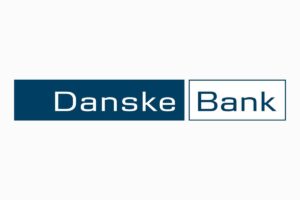
Danske Bank UK offers a Business Current Account tailored to small and medium-sized businesses.
Fees and charges
The account comes with a monthly fee of £5.50 and includes access to online banking, mobile banking, and a debit card.
Transaction fees include 70p for each cheque paid in or issued, 35p for direct debits, and 35p for electronic payments. Cash handling is charged at 0.75% of the amount. Interest is not typically paid on current account balances.
Eligibility
Eligibility requirements include having a business operation in the UK and standard identity verification.
Read our Danske Bank UK review or visit the website.
24. Fair Everywhere

Fair Everywhere focuses on providing business banking services with an emphasis on multi-currency accounts, suitable for businesses with international dealings.
Fees and charges
Their account offers a flat monthly fee of £12.50, which includes free electronic payments and ATM withdrawals.
Business account features
Additional features include the ability to hold, manage, and exchange money in 31 currencies. There’s also a 1% cashback on all purchases made with their business card.
Eligibility
The account is available to UK-registered businesses, with a straightforward online application process requiring standard business and personal identification documents.
Read our Fair Everywhere review or visit the website.
25. GoSolo

GoSolo is designed specifically for startups, freelancers, and small business owners.
Business account features
This digital business account focuses on simplifying business banking with features such as easy invoicing, expense tracking, and instant payment notifications.
Fees and charges
GoSolo offers a straightforward fee structure with no monthly account fees. Transactions within the UK are generally free, including bank transfers and card payments.
However, there are fees for international transactions and currency exchange, typically a small percentage of the transaction amount.
The account also offers a prepaid Mastercard for business expenses.
Eligibility
Eligibility for a GoSolo account includes being a UK resident and having a UK-registered business, with the application process completed online.
Read our GoSolo review or visit the website.
26. Hampshire Trust Bank

Hampshire Trust Bank specialises in business savings accounts and does not offer a standard business current account.
Business account features
Their business savings accounts, such as the Business Notice Account, offer competitive interest rates, for example, a 90-Day Notice Account currently provides a rate of around 0.75% AER.
Fees and charges
There are no monthly fees for maintaining these accounts, but access to funds requires notice depending on the account type.
Eligibility
To open an account, businesses need to be registered in the UK, and additional criteria may apply based on the specific account type.
Read our Hampshire Trust Bank review or visit the website.
27. Holvi

Holvi, a digital banking service for freelancers and entrepreneurs, offers a business current account with integrated financial management tools.
Fees and charges
Their basic account, Holvi Lite, has no monthly fee and includes features like online invoicing and a Mastercard.
The Holvi Pro account, at €12 per month, offers additional features like advanced bookkeeping. Transaction fees include €0.25 for SEPA transfers, and card payments are free.
Cash withdrawals are charged at €2.50 each.
Eligibility
Holvi accounts are available to businesses registered in the countries where Holvi operates, with an online application process requiring business and personal identification.
Read our Holvi review or visit the website.
28. HSBC
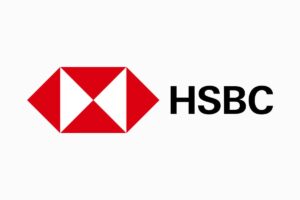
HSBC offers a range of business bank accounts, including the Business Current Account and the Electronic Banking Account.
Fees and charges
The Business Current Account has a monthly account fee of £6.50, with additional charges for transactions: 23p per cheque, 23p per £100 cash deposited or withdrawn, and 35p for electronic payments.
Business account features
The Electronic Banking Account is designed for businesses that mainly transact online, with lower electronic transaction fees.
HSBC also offers business savings accounts with variable interest rates depending on the account balance.
Eligibility
Eligibility criteria include proof of business operation in the UK and standard identification verification.
Read our HSBC review or visit the website.
29. ICICI Bank UK

ICICI Bank UK provides a Business Current Account targeted at small to medium-sized businesses, particularly those with a need for international banking services.
Fees and charges
The account carries a monthly fee of £25, which is waived if the average monthly balance exceeds £25,000.
Transaction fees include 25p per cheque issued, 25p for electronic payments, and a 0.5% charge for cash handling (min £1).
The bank also offers business savings accounts with interest rates varying based on the deposit amount and term.
Eligibility
Eligibility criteria include having a business registered in the UK and meeting the bank’s business profiling criteria.
Read our ICICI Bank UK review or visit the website.
30. Intergiro

Intergiro is a fintech company offering digital banking services tailored for businesses, especially those operating internationally.
Their business account features include multi-currency capabilities, virtual IBANs, and corporate cards.
Fees and charges
They offer several account plans, with the basic plan having no monthly fee but charging for transactions: for instance, SEPA transfers cost €0.30, and there’s a 1% fee on foreign currency transactions.
Higher-tier plans, like Intergiro.6, cost €60 per month, offering free unlimited transactions and lower foreign exchange fees.
Eligibility
Eligibility criteria are generally flexible, focusing on businesses with an international footprint.
Read our Intergiro review or visit the website.
31. Kent Reliance

Kent Reliance, primarily a savings and mortgage provider, offers business savings accounts rather than transactional current accounts.
Business account features
Their Business Savings Account requires a minimum deposit of £1,000, with no monthly account maintenance fees.
The interest rates are competitive, with their Business 60-Day Notice Account offering around 0.55% AER on balances. Interest is calculated daily and paid monthly or annually.
Eligibility
These accounts are suitable for UK-registered businesses looking for a place to hold surplus funds. The application process requires standard business documentation.
Read our Kent Reliance review or visit the website.
32. Kinetic

Kinetic is a digital banking platform provided by HSBC, designed specifically for small businesses and startups.
Business account features
It offers a business current account with no monthly fee and features such as digital bookkeeping, invoicing, and spending analytics.
The account is integrated within the HSBC banking system, providing access to additional banking services.
Fees and charges
Transactions are mostly free, including electronic payments and ATM withdrawals. However, there may be fees for services like international payments.
Eligibility
Eligibility is focused on UK-based businesses, with an application process that includes business and personal identification verification.
Read our Kinetic review or visit the website.
33. Lloyds Bank
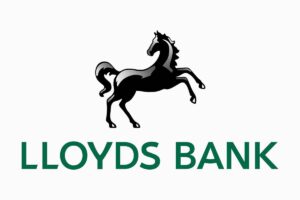
Lloyds Bank offers a Business Current Account with a range of features suitable for small to medium-sized businesses.
Fees and charges
New businesses benefit from 12 months of free day-to-day banking, after which a monthly fee of £7 applies.
Transaction fees after the free period include 70p per cheque, 70p for direct debits, and 30p for electronic payments. Cash handling is charged at 0.75% of the value.
They also offer business savings accounts, with interest rates varying based on the account and balance.
Eligibility
Eligibility criteria include proof of business operation in the UK and standard identity checks.
Read our Lloyds Bank review or visit the website.
34. Masthaven

Masthaven, primarily known for its mortgages and savings products, offers Business Savings Accounts rather than transactional current accounts.
Business account features
Their Fixed Term Business Savings account requires a minimum deposit of £5,000 and offers competitive interest rates, for example, a 1-Year Fixed Term account might offer around 0.60% AER.
Fees and charges
There are no monthly maintenance fees, but access to funds is restricted until the end of the term.
Eligibility
The account is available to UK-registered businesses, with an application process that includes standard business documentation and verification.
Read our Masthaven review or visit the website.
35. Metro Bank
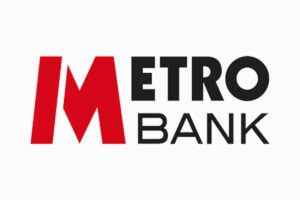
Metro Bank provides a Business Current Account aimed at businesses of all sizes.
Business account features
The account features include online banking, mobile banking, and in-branch services.
Fees and charges
They offer a tariff-free banking offer for businesses with lower transaction volumes, and for larger businesses, there’s a tariff that includes a £5 monthly fee, 30p per cheque, and 30p for electronic payments. Cash handling is charged at 0.5% of the value.
Metro Bank also offers Business Savings Accounts, with interest rates depending on the account type and balance.
Eligibility
Eligibility criteria include having a business operation in the UK and undergoing standard identification verification.
Read our Metro Bank review or visit the website.
36. Mettle

Mettle, powered by NatWest, offers a free mobile business account targeted at small businesses and freelancers.
Business account features
Mettle accounts are managed entirely via a mobile app, providing a digital-first banking experience.
Fees and charges
Transactions, including electronic payments and ATM withdrawals, are free of charge.
There are no monthly fees, and the account includes features such as invoicing, expense management, and cash flow forecasting.
Eligibility
To be eligible, businesses must be UK-based sole traders or limited companies, and the application process is conducted online, requiring standard identification and business details.
Read our Mettle review or visit the website.
37. Monese

Monese provides a business account designed for small businesses and freelancers, with a focus on simplicity and quick setup.
Business account features
The account also offers features like multi-currency support, expense tracking, and integration with accounting software.
Fees and charges
Their business account has a monthly fee of £9.95, which includes free UK bank transfers, debit card transactions, and ATM withdrawals. International transfers incur a fee, usually 2% of the transaction amount.
Eligibility
Eligibility requirements are minimal, generally including identity verification and proof of business operation, making it accessible to a wide range of businesses.
Read our Monese review or visit the website.
38. Monzo

Monzo offers a Business Current Account with two tiers: Lite, which is free, and Pro, which costs £5 per month.
Business account features
The Lite version includes basic banking features, while the Pro version offers additional tools like integrated accounting and multi-user access.
Both versions provide features such as instant notifications, categorised spending, and depositing cash through PayPoints (charged at £1 per deposit).
Eligibility
Monzo’s business account is available to sole traders and limited companies based in the UK, and the application process includes identity verification and business details.
Read our Monzo review or visit the website.
39. Nationwide
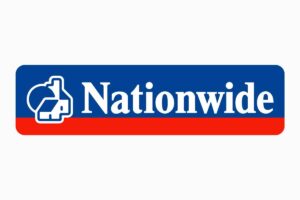
Nationwide Building Society does not currently offer a dedicated business current account.
They focus primarily on personal banking products, including savings and mortgage accounts.
Business account features
For businesses, they offer savings accounts like the Business Savings Account, which provides competitive interest rates for surplus funds.
The interest rates and fees for these accounts vary based on the account type and balance amount.
Eligibility
Nationwide’s business savings accounts are generally available to UK-registered businesses, with standard documentation required for account opening.
Read our Nationwide review or visit the website.
40. NatWest
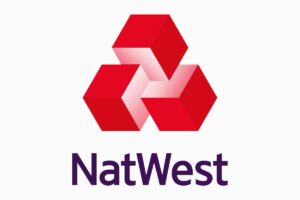
NatWest offers a Business Current Account with various features to support small to large businesses.
Fees and charges
New customers enjoy 18 months of free banking, after which charges apply based on account usage.
Standard fees include 35p per transaction for electronic payments and direct debits, and 70p per cheque. Cash handling is charged at 0.7% of the value.
NatWest also provides business savings accounts with variable interest rates.
Eligibility
Eligibility criteria include being a UK-based business, and the bank may require additional documentation for account opening.
Read our NatWest review or visit the website.
41. OakNorth
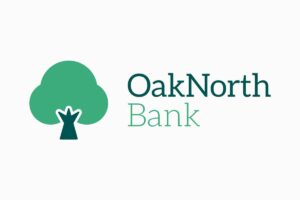
OakNorth Bank offers business savings accounts rather than transactional current accounts.
Business account features
Their Fixed Term Savings accounts provide competitive interest rates, with terms ranging from 6 months to 3 years. For example, a 12-month Fixed Term account might offer an interest rate of around 0.60% AER, with a minimum deposit of £1,000.
Fees and charges
There are no monthly account fees, but access to funds is restricted until the end of the fixed term.
Eligibility
OakNorth’s savings accounts are suitable for businesses looking for a fixed return on their surplus cash. Eligibility criteria include UK registration and standard business documentation.
Read our OakNorth review or visit the website.
42. PayPal

PayPal offers business accounts primarily tailored for online transactions and e-commerce businesses.
Business account features
The account provides features like online invoicing, payment processing, and integration with e-commerce platforms.
Fees and charges
PayPal charges per-transaction fees, which vary depending on the type of transaction and sales volume.
For example, domestic sales are typically charged at 2.9% + a fixed fee per transaction. International sales incur additional charges.
PayPal also offers merchant services, like card readers for physical transactions, with separate fee structures.
Eligibility
The account is available to UK-based businesses with an easy online setup process.
Read our PayPal review or visit the website.
43. Redwood Bank

Redwood Bank focuses on business savings accounts and commercial mortgages, not offering a standard business current account.
Business account features
Their Business Savings Accounts include Notice Accounts and Fixed Term Deposits, offering competitive interest rates. For instance, their 95-Day Notice Account may offer an interest rate of around 0.65% AER, subject to a minimum deposit of £10,000.
Fees and charges
There are no monthly maintenance fees, but funds are accessible only after the notice period.
Eligibility
Eligibility requirements include being a UK-registered business and the provision of standard business documentation.
Read our Redwood Bank review or visit the website.
44. Revolut Business

Revolut Business provides a range of digital banking services for businesses, including current accounts with multi-currency support, corporate cards, and expense management tools.
Fees and charges
Their pricing plans range from the free Start plan, which includes basic banking features, to the Enterprise plan with custom pricing for larger businesses.
Transaction fees vary by plan, with free plans charging for certain services like international transfers and ATM withdrawals. Higher-tier plans offer more free transactions and lower foreign exchange fees.
Eligibility
Revolut Business accounts are available to businesses in the European Economic Area and Switzerland, with a straightforward online application process.
Read our Revolut Business review or visit the website.
45. Royal Bank of Scotland
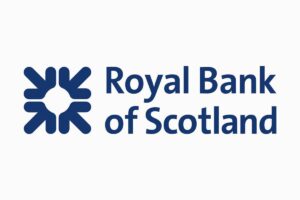
The Royal Bank of Scotland (RBS) offers a Business Current Account designed for small to medium-sized businesses.
Fees and charges
New customers typically benefit from 24 months of free banking, which includes no charges for standard transactions.
After this period, fees apply, such as 35p per electronic payment and 70p per cheque transaction. Cash handling is charged at 0.7% of the transaction value.
RBS also offers business savings accounts with variable interest rates.
Eligibility
Eligibility criteria include being a UK-based business, and businesses may be required to provide additional documentation upon account opening.
Read our RBS review or visit the website.
46. Santander
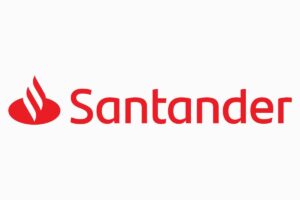
Santander provides a range of business banking products, including the Business Current Account and the 1|2|3 Business Current Account.
Fees and charges
The standard Business Current Account has a monthly fee of £7.50, with transaction fees including 50p for cash deposits per £100 and 50p per cheque paid in or issued.
The 1|2|3 Business Current Account, with a monthly fee of £12.50, offers cashback on certain transactions and additional benefits.
Santander also offers business savings accounts with competitive interest rates.
Eligibility
Eligibility criteria for these accounts include UK residency and proof of business operation.
Read our Santander review or visit the website.
47. Shawbrook Bank
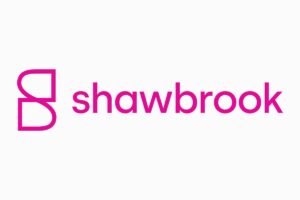
Shawbrook Bank specialises in savings and loan products, offering Business Savings Accounts but not standard current accounts.
Business account features
Their business savings accounts include Easy Access and Fixed Term accounts, providing competitive interest rates for surplus funds.
For example, their 120-Day Notice Business Savings Account offers an interest rate of approximately 0.55% AER.
Fees and charges
There are no monthly fees, but access to funds requires adherence to the notice period.
Eligibility
These accounts are available to UK-registered businesses, with the application process requiring standard business documentation.
Read our Shawbrook Bank review or visit the website.
48. Silverbird

Silverbird is a financial services provider offering business accounts primarily for companies engaged in international trade.
Business account features
Their account features include multi-currency support, cross-border payments, and tailored financial solutions for e-commerce businesses.
Fees and charges
Transaction fees vary depending on the type of transaction and the currencies involved.
For instance, currency exchange transactions typically involve a small markup on the interbank exchange rate.
Eligibility
The account is accessible to businesses operating globally, with an application process that includes standard business and identity verification.
Read our Silverbird review or visit the website.
49. Starling Bank

Starling Bank provides a digital business account for sole traders, freelancers, and limited companies.
Fees and charges
The account has no monthly fees and offers features like free UK bank transfers, instant payment notifications, and in-app categorisation of transactions.
For cash deposits, Starling charges £3 per deposit at Post Office branches. International transfers incur a fee of 0.4% of the transaction amount plus a flat delivery fee.
Starling’s business savings account offers an interest rate of 0.05% AER on balances.
Eligibility
Eligibility criteria include being a UK resident and the provision of business and personal identification.
Read our Starling Bank review or visit the website.
50. State Bank of India (UK)
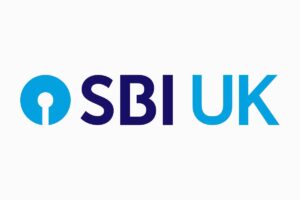
The State Bank of India (UK) offers business accounts including a Business Current Account and various types of savings accounts.
Business account features
Their Business Current Account requires a minimum balance of £5,000 to avoid monthly fees.
The bank also provides Fixed Deposit accounts for businesses, offering higher interest rates for fixed-term deposits.
Fees and charges
Transaction fees include 25p for electronic payments and £1 for cash deposits per £100.
Eligibility
Eligibility requirements for these accounts include being a UK-registered business and meeting the bank’s specific criteria, which may include additional documentation.
Read our State Bank of India UK review or visit the website.
51. Tide

Tide is a digital-only banking service designed for small businesses and freelancers.
Business account featuress
Their Free plan includes a UK business current account with no monthly fees and offers features such as free UK bank transfers, invoicing, and expense management.
Fees and charges
There’s a charge of 20p per ATM withdrawal and 3% on foreign currency transactions.
Tide also offers Plus and Premium plans at £9.99 and £49.99 per month, respectively, which include additional benefits like dedicated support and legal advice.
Eligibility
Eligibility for opening a Tide account includes being a UK resident and having a UK-registered business.
Read our Tide review or visit the website.
52. Triodos Bank
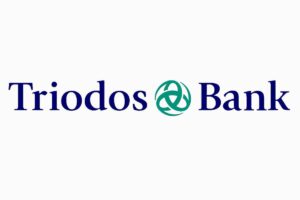
Triodos Bank focuses on sustainable and ethical banking, offering business current accounts for organisations that align with these values.
Business account features
Their account has a monthly fee of £7.50, with transaction fees including 40p for electronic payments and £0.60 per cheque.
Cash handling is charged at 0.5% of the value. Triodos also offers business savings accounts with varying interest rates, promoting eco-friendly and socially responsible projects.
Eligiblity
Eligibility criteria include a business assessment to ensure alignment with the bank’s ethical standards.
Read our Triodos Bank review or visit the website.
53. TSB
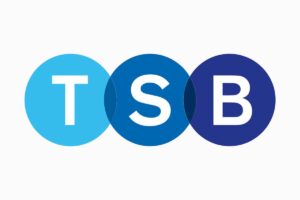
TSB offers a Business Current Account suitable for small to medium-sized enterprises.
Fees and charges
They provide 25 months of free banking for new businesses, after which a monthly fee of £5 applies if the balance falls below £10,000.
Transaction fees after the free period include 40p for each cheque paid in or issued and 40p for each paper transaction. Electronic payments are generally free.
TSB also provides business savings accounts with interest rates depending on the account and balance.
Eligibility
Eligibility requirements include being a UK-based business with appropriate documentation for account opening.
Read our TSB review or visit the website.
54. Ulster Bank
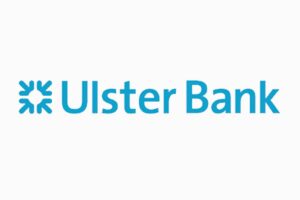
Ulster Bank offers a Business Current Account aimed at small to medium-sized businesses.
Fees and charges
New customers typically enjoy up to 24 months of free banking, which includes no charges for everyday transactions.
After this period, a monthly fee applies, along with transaction fees like 30p per cheque and 30p for direct debits. Cash handling charges are also applicable at 0.65% of the transaction value.
Ulster Bank also offers business savings accounts with varying interest rates.
Eligibility
Eligibility criteria include operating a business in the UK and meeting standard identification requirements.
Read our Ulster Bank review or visit the website.
55. United Trust Bank

United Trust Bank specialises in providing savings and lending products rather than transactional current accounts.
Business account features
Their Business Savings Accounts include Notice Accounts and Fixed Term Deposits, offering competitive interest rates.
For instance, a 100-Day Notice Account might offer around 0.60% AER, depending on the deposit amount.
Fees and charges
These accounts typically do not have monthly maintenance fees, but access to funds requires adherence to the notice period or term.
Eligibility
Eligibility for these accounts includes being a UK-registered business and meeting the bank’s criteria for account opening.
Read our United Trust Bank review or visit the website.
56. Virgin Money

Virgin Money provides a Business Current Account with features tailored for small and medium-sized enterprises.
Fees and charges
The account offers free everyday banking for a certain period (e.g., 25 months for new businesses), after which standard charges apply.
Transaction fees include 30p per cheque, 30p for direct debits, and a cash handling fee of 0.65% of the value.
They also offer business savings accounts with variable interest rates.
Eligibility
Eligibility for opening an account includes UK residency and proof of business operation, along with standard business documentation.
Read our Virgin Money review or visit the website.
57. Wise

Wise, formerly known as TransferWise, offers a multi-currency business account primarily designed for international transactions.
Business account features
The account allows businesses to hold, manage, and convert 50+ currencies and send money to 80 countries at the real exchange rate.
Fees and charges
There are no monthly fees for account maintenance.
Fees for converting currencies are transparent and low-cost, typically involving a small percentage of the transaction.
Additionally, Wise charges nominal fees for international payments, which vary based on the destination and amount.
Eligibility
The account is suitable for freelancers, sole traders, and businesses with international dealings, with minimal eligibility requirements.
Read our Wise review or visit the website.
58. Yorkshire Bank
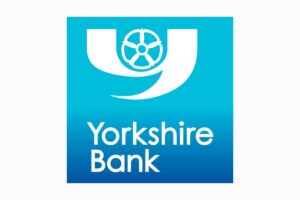
Yorkshire Bank provides a Business Current Account suitable for various types of businesses, from startups to established companies.
Fees and charges
They offer 25 months of free banking for new customers, which includes free day-to-day banking transactions.
After this period, a monthly account fee applies, along with transaction fees such as 30p per cheque and electronic payments, and a 0.65% charge for cash handling.
Yorkshire Bank also offers business savings accounts with competitive interest rates.
Eligibility
Eligibility criteria include being a UK-based business, and additional documentation may be required during the application process.
Read our Yorkshire Bank review or visit the website.
| Important |
|---|
| For the most accurate and up-to-date information, it’s recommended to directly contact these financial institutions or visit their official websites. |
How to open a business bank account?
Opening a business bank account is one of the first steps to starting a successful business. Having a dedicated bank account will help you manage your finances and keep track of where your money is going. It’s important to shop around for the right banking solution that best suits your specific needs.
Once you have decided on your banking provider, follow these steps to open a business bank account:
How to open a business bank account
- Choosing the right bank and account type
Research and compare various banks and the types of business accounts they offer. Consider factors like fees, overdraft facilities, interest rates, online banking options, and additional services that could benefit your business, such as a business savings account or a business credit card.
- Preparing the necessary documents
You will need several documents to open a business bank account in the UK. These typically include:
• Proof of identity (e.g., passport, driving licence)
• Proof of address (e.g., recent utility bill or council tax bill)
• Business details (e.g., business name, address, contact information)
• Companies House registration documents (for limited companies)
• Partnership agreement (for partnerships)
• Business plan (may be required by some banks)
• Estimated annual turnover - Completing the application
Most banks offer the option to apply online, by phone, or in person. Choose the method that suits you best. Fill out the application form with the required information, ensuring accuracy to avoid any delays.
- Verification process
The bank will verify your identity and assess your application. This process includes checking your credit history and ensuring your business meets their criteria. Be prepared for the bank to request additional information or documentation.
- Account approval and setup
Once your application is approved, the bank will set up your account. You will receive your account number, sort code, and any necessary online banking details. Some banks may also provide cheque books and debit cards.
- Understanding and managing your account
Familiarise yourself with the terms and conditions of your account, including any fees, charges, and the services included. Set up any required online banking and ensure you know how to use it effectively for your business needs.
Once you have opened your business bank account, make sure to monitor your account regularly. Ensure that all transactions are accurate and familiarise yourself with the banking services offered by your provider so you can make the most of them.
Remember to also keep all records related to business banking in a secure place for future reference.
FAQ for best business bank accounts
A business bank account is a financial tool designed to help businesses manage their finances. It is distinct from an individual’s personal banking account and allows for greater flexibility when dealing with larger sums of money, such as those generated through sales or investments.
Business bank accounts also offer access to additional services tailored to the needs of a particular organisation, including loans and lines of credit, overdraft protection, and online accounting software.
By utilising a business bank account to manage their finances, businesses can ensure that they are in compliance with the legal requirements associated with running a business. Additionally, it can help businesses better track their income and expenses and make more informed decisions about the direction of their company.
Business bank accounts offer a number of advantages for businesses, including:
Access to financial services – Business bank accounts offer access to a range of financial services that are tailored specifically for business activities. This includes access to overdrafts and credit, as well as payment solutions such as online banking, payment cards and more.
Improved cash flow – By separating personal and business income and expenses, businesses can more easily keep track of their financial activity. This helps with budgeting as well as understanding where money is coming from and going to in the business.
Easier tax preparation – With all business transactions recorded in one place, it’s much easier to prepare accurate and timely tax returns.
Enhanced credibility – Having a business bank account creates the perception that your business is legitimate, which can help when dealing with customers, suppliers and other stakeholders.
Higher savings interest rates – Businesses may be able to access higher interest rates on deposits than those offered on personal accounts.
To open a business bank account in the UK, you’ll need several key documents and pieces of information.
Firstly, provide proof of your identity and address, typically through a passport or driving licence and a recent utility bill or council tax bill. You’ll also need to present detailed information about your business, including its name, address, and contact details.
For limited companies, registration documents from Companies House are required, while partnerships should provide their partnership agreement.
Some banks may ask for a business plan, especially for new businesses, and information about your estimated annual turnover.
It’s important to prepare these documents in advance to ensure a smooth and efficient account opening process.
The best business bank account will depend on your individual needs. Before you choose a provider, take the time to compare different banking services and products offered by various banks.
Consider factors such as fees, interest rates, customer service, and online banking features.
Also consider your legal status, such as sole trader, freelancer or limited company.
Additionally, make sure to assess the terms and conditions of each bank account to ensure that it meets your specific needs.
Closing a business bank account is not as straightforward as opening one. Before you close an account, ensure that all outstanding payments have been made and that no additional deposits are due.
Additionally, it is important to keep in mind that closing your business bank account may affect your credit score and other relationships with the banking institution. To close a business bank account, follow the steps below:
1. Contact your bank and inform them that you would like to close the account.
2. Provide all necessary documentation such as a letter of request, proof of identity, and details about the account closure.
3. Sign any required paperwork or submit documents online if applicable.
The amount of time it takes to open a business bank account varies from one institution to another. Generally, the process can take anywhere from a few days to several weeks depending on the complexity of your application and the documents you need to provide. For example, if you are applying for an online banking solution, approval may be granted within a few days.

